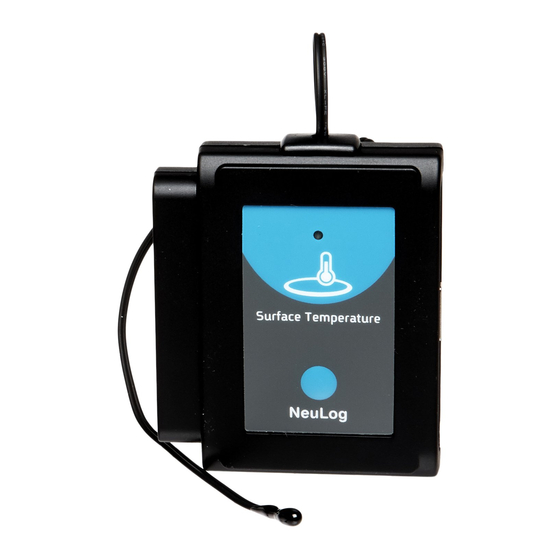
Table of Contents
Advertisement
Quick Links
NeuLog surface temperature logger sensor
NUL-233
The NeuLog surface temperature sensor can be used for any science experiment
which requires accurate temperature measurements such as in the fields of Physics,
Chemistry, Biology, Environmental Science, etc.
The sensor comes pre-calibrated so you can start experimentation right out of the box
using this guide.
Using the surface temperature over the standard temperature sensor has its
advantages:
It can be attached to surfaces easily with tape.
Its response time is faster due to the partially exposed thermistor.
It is more flexible and can fit into smaller areas.
A smaller surface area means you can accurately gauge the temperature of a
specific point instead of that of a larger area.
Among hundreds of possible experimental subjects that can be studied with the
NUL-233 sensor are: exothermic and endothermic chemical reactions, metabolism,
heat and energy transfer, human temperature changes, effects of heat on enzyme
function, weather studies, material thermal conductance properties, and many more.
This sensor is capable of measuring both in Celsius and Fahrenheit.
Celsius: The SI (International System of Units) unit of temperature.
Fahrenheit: The temperature measurement unit of the English System commonly used
in the United States.
Quick start procedure:
PC or Mac Computer
Materials needed:
NUL-233 Surface Temperature Sensor
USB-200 USB Module
USB to mini USB cable (included with the USB-200 module)
NEULOG SURFACE TEMPERATURE LOGGER SENSOR GUIDE
Your surface temperature sensor needs to be connected to a USB-200 module. The
USB-200 module then connects to a computer via a USB to mini-USB cable. Please
note that you cannot plug the surface temperature sensor directly into the computer.
The browser based application can be downloaded for free at
well as a full application user guide.
Choose "Downloads" on the main menu and then choose "Software and Application".
Procedure:
1.
Install the NeuLog application.
2.
Connect the USB-200 module to the PC or Mac.
3.
Connect the surface temperature sensor to the USB-200 module (they directly
plug together). Please note that there is no calibration required for this sensor.
4.
Open the NeuLog application by clicking on the shortcut on the screen.
5.
Once the surface temperature sensor module box appears on the left side of the
screen the probe has been automatically identified and you can begin
experimentation.
If the surface temperature sensor is not automatically identified, click the "Search
6.
for sensors" icon to find the sensor.
Click on the "On-line experiment" icon; this will open a graph below.
7.
Click on the "Module setup" button located in the surface temperature sensor
8.
module box to change the sensor's settings if need be.
9.
Click on the "Experiment set up" icon to change the experiment settings if need
be (experiment duration for example).
10.
The surface temperature sensor will give a live reading in its module box to the
left of the screen while plugged in.
To run an experiment and collect data click the "Run experiment" icon.
11.
To end data collection early, click the "Stop experiment" icon.
12.
Tablet, smart phone device
Materials needed:
NUL-233 Surface Temperature Sensor
WIFI-201 WiFi Module
BAT-200 Battery Module
Your surface temperature sensor needs to be connected to a WIFI-201 module. The
WIFI-201 module will create a closed NeuLog WiFi network which will stream the
NeuLog data to a device of your choosing. Once your device is wirelessly connected
to the NeuLog network, you can run experiments and collect data through a browser
of your choosing.
www.NeuLog.com
as
Advertisement
Table of Contents

Summary of Contents for NeuLog NUL-233
- Page 1 WIFI-201 module will create a closed NeuLog WiFi network which will stream the USB to mini USB cable (included with the USB-200 module) NeuLog data to a device of your choosing. Once your device is wirelessly connected to the NeuLog network, you can run experiments and collect data through a browser...
- Page 2 Once the sensor appears it will be monitoring data in real time. Take your tablet or smart phone, go to the WiFi settings and select the NeuLog To run an experiment and collect data, press the run icon (little green person).
- Page 3 NeuLog body. This technology allows the sensor to collect and then store the digital data in the correct scientific units ( F, Lux, %, ppm, for example).
- Page 4 NEULOG SURFACE TEMPERATURE LOGGER SENSOR GUIDE Thank you for using NeuLog! Maintenance and storage: Never submerge the NeuLog plastic body in any liquid. Do not allow liquid into the surface temperature sensor’s body. Do not use the probe in corrosive liquids.







Need help?
Do you have a question about the NUL-233 and is the answer not in the manual?
Questions and answers